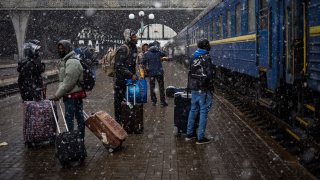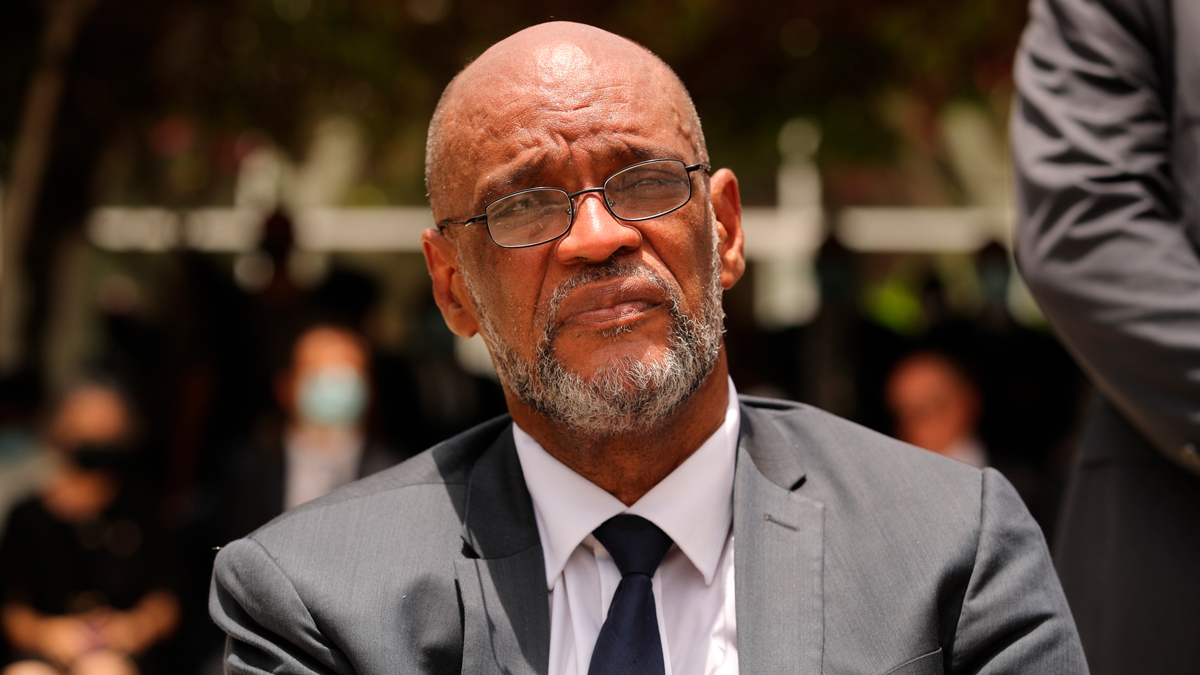
Jarred by discriminatory treatment and left to evacuate themselves from Ukraine, people from African, Asian and Latin American countries who succeed in getting out are forming impromptu networks to help thousands of others hoping to flee.
Stepping into the gap was an easy decision for Alexander Somto Orah, 25, a Nigerian student in Ukraine who, like some others, described xenophobiaand threats of violence as he approached the border with Poland shortly after Russia's invasion.
Ukrainian border guards “separated Africans, together with Indians, from the rest and directed us to the Romanian border” scores of miles away, Orah said. “They told us that if we try to push our way through, they are going to shoot us.” Video shared with The Associated Press shows the confrontation.
United by fear and outrage after days in the freezing weather, the young foreigners started to protest. “We raised our hands and told them we are students and just want to go home,” Orah said. Eventually, they were allowed to cross.
Get South Florida local news, weather forecasts and entertainment stories to your inbox. Sign up for NBC South Florida newsletters.
Since reaching Poland's capital, Warsaw, he has returned to the border multiple times to help other foreigners leave Ukraine, drawing on his experience.
Almost 80,000 third-country nationals from 138 countries have fled, the International Organization for Migration said Friday.
Some have reported being denied access to bomb shelters, transportation and even access to consulates of their countries of origin in neighboring countries, the U.N. special rapporteur on contemporary forms of racism, Tendayi Achiume, said Thursday, calling the racist and xenophobic treatment “life-threatening.”
U.S. & World
The experiences are shaping the grassroots efforts to help others leave.
Ojonugwa Zakari, 21, a medical student from Nigeria, said she and hundreds of other foreigners remain stuck in Sumy, a city in northeastern Ukraine. As they wake to the sound of shelling, their phones now fill with tips on how to escape: Phone numbers of friendly locals across the border. Guidance on emergency supplies and what documents to show at checkpoints.
“Basically, the basic war advice,” said Zakari, who’s never been in war before.
She added: “It’s no longer about where people are from. People are just trying to make sure that if you’re a foreigner in Ukraine, you get to safety."
Ukraine’s government has addressed allegations of discrimination against fleeing foreigners amid sharp comments like the one by the African Union continental body, which called dissimilar treatment of Africans “shockingly racist” and in breach of international law.
“Africans seeking evacuation are our friends and need to have equal opportunities to return to their home countries safely,” Ukrainian Foreign Minister Dmytro Kuleba tweeted Wednesday,. He later shared on Twitter a hotline number established to help African, Asian and other students wishing to leave.
Within 12 hours, the phone number had been retweeted more than 21,000 times. The following day, however, the hotline rang unanswered.
Other official statements of aid, even from foreigners' home countries, have felt remote as well.
Shortly after Russia’s invasion started on Feb. 24, Zimbabwe’s government told its citizens in Ukraine to contact their embassy in Germany, on the other side of Poland. Kenya's government suggested its embassy in Austria, similarly far away.
Since then, some countries have announced deals with Ukraine’s neighbors to facilitate the entry of their citizens. Others are trying to evacuate those who can’t make it out. But the death of an Indian student in Russian shelling in Kharkiv, Ukraine's second-largest city, created new urgency.
Worried students and others have created WhatsApp and Telegram messaging groups for Africans, Brazilians and other populations with large numbers trying to leave. Some platforms offer financial or even mental health assistance.
Faith Chemari said she has helped over 50 Zimbabwean students by coordinating their bus travel toward Poland.
”I was putting students in groups, with boys leaving first, so as to give feedback to the rest of the students on whether it was safe," she said.
Along Ukraine's borders, a global community has begun to gather to welcome exhausted countrymen making their way out. Others inside Ukraine assist travelers to the next destination. “In Odesa, our Azeri people welcomed us and they helped us get to the Moldova border,” said Elxan Salmanov Ilham, a 28-year old student from Azerbaijan who fled Kharkiv.
As support grows, some locals in Ukraine's neighboring countries are taking part.
After spending the night at the train station in the western Ukrainian city of Lviv, Nigerian student Sanusi Salihu urgently needed food and shelter. He found both from a resident he met shortly after entering Slovakia.
“We are seven in his house,” Salihu said. “He just took us all out for lunch (and) ... has been very nice.”
Now, Salihu, too, does what he can from his new position of safety, messaging foreigners still in Ukraine.
___
Tsvangirayi Mukwazhi in Harare, Zimbabwe, and Grace Ekpu in Lagos, Nigeria, contributed.
___
Follow the AP’s coverage of the Ukraine crisis at https://apnews.com/hub/russia-ukraine



